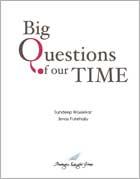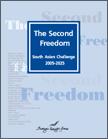Crouching Dragon: Chinese Peasants
|
|
November 2005
By Rashmi Jethani
|
While the world is impressed by China�€™s industrial progress, it may be in for a shock in the rising Asian power�€™s countryside. China might be able to manage its much-feared banking crisis and might even tide over the disharmony between political autocracy and economic liberalism. However, despite the best intensions of the new team led by Hu and Wen, it may experience a rebellion in its farmlands in the next decade.
Ever since the Qin Empire was established about two centuries before Christ, China has again and again faced peasant rebellions. A poor Henan farmer, Chen Sheng, led a rebellion, which brought down the first ever-Chinese empire. History has been repeated several times in the last two millennia. Will it repeat again in the second or third decade of the twenty first century?
Under the Deng reforms, China has developed a dualistic economic structure with a Business Class of less than one fourth population in the cities of South and East and a Periphery of almost a billion people residing in the country side. The Chinese Household Registration System (Hukou) divides the population into �€œagricultural�€ and �€œnon-agricultural�€ sectors, a tool is that obviously used for discrimination with respect to good jobs, education, housing, health-care, and even migration.
Economic reforms of the 1980s initially received support from the peasantry who also benefited from it. However, since the late 1980s China has experienced distorted development due to the fast paced growth in the urban centres, declining prices for agricultural products, the rising cost of farming and excessive fee collection by local governments.
The farmers in China do not even have land ownership rights. There are about 373 million peasants forming about 49 per cent of China�€™s total labour force of 750 million. The land is legally owned by the State and is leased out on a long�€“term basis to individual farm households. A minority of wealthy farmers connected to the regime control the most profitable land while most peasants barely eke out an existence or have been driven off the land altogether.
It is widely documented that China has recorded 78,000 major protests nationwide this year (2005), up from 58,000 in 2003 and 10,000 in 1994. Villagers and peasants have been at the forefront of this growing unrest in China. Land grab and rampant corruption in the rural areas have been the primary factors for discontent. Apart from this, illegal taxation and shortage of resources have been supplementary causes of unrest. Most rural agitations stem from disparate education and lack of employment opportunities, which have further led to growing income inequalities.
The urban income is over three times more than the rural income where the disparity ratio stands to 3.2:1 with figures of 9422 Yuan (1135 US$) and 2936 Yuan (354 US$) for urban and rural sectors respectively.
About 40 million farmers have lost their land to misappropriation by government since over a decade. This has to be seen in the context of gross unemployment estimated at (including both urban and rural sectors) 150 million. Farmers have been forced to migrate to the cities to find work. Statistics from the Ministry of Agriculture indicate that over 100 million of China�€™s rural surplus labourers have already moved into urban areas and another 150 million will migrate in the next 15 years. Although, migrant workers from rural areas have become the backbone of urban economic activities taking on most of the low level positions many discriminatory policies have prevented migrants from integrating into the urban society. They are often treated like second-class citizens in terms of employment, social welfare, healthcare and education.
In addition to illegal land eviction, another corrupt practice to which peasants are subjected to is extortion of taxes by village officials. Rural taxation in China is unique as state taxes are levied on agricultural and non-agricultural operations; while local governments at the county and township level, and community organizations at the village level fill their financial gap by levying various fees on rural households.
This makes the farmers position very vulnerable and they consequently become victims of land related corruption by local officials. At present the peasants are paying over 360 different types of taxes and fees. Apart from the burden of high taxes, the farmers do not even benefit from the profits they earn on their crops/produce due to state monopolization of the distribution and marketing. Press reports indicate that farmers have been recently denied land requisition compensation and relocation fees of about 10 billion Yuan.
Well aware of the acute dangers of social crisis over the past several months, the Chinese regime has developed a carrot and stick policy. In response to the escalating social tensions, the Chinese government has announced (18th August 2005) the formation of specialised, heavily armed �€œanti-terror�€ and riot police units in 36 major cities, including Beijing, Shanghai, Chongqing and Tianjin.
Wen Jiabao, the Chinese premier once described 2005 is the year full of hard nuts to crack, a year of reforms in China. Rural reform was brought to prominence in the 16th CPC�€™s Central Committee Session in 2004, focusing its attention on the solution of �€œthree dimensional rural problems�€. One thrust of the new Chinese policy is on harmonising agricultural and industrial development and creating urban centres in the rural backyard.
Major rural policies aim at regulating the relation between the state officials and the farmer, reforming grain distribution policies and enhancing government�€™s protection over farmer�€™s basic rights and interests. Improving farmer�€™s social status and easing rural social tensions is also at the top of the agenda. President Hu Jintao repeatedly stresses that �€œbuilding a harmonious socialist society�€ is essential to overcome inequalities.
The �€œNumber One Document�€ of 2005 aims to promote rural development and reforming the agrarian policies. There is a considerable discussion going on within the Communist Party about reforming the farm taxation. There is also discussion on social security schemes, which can guarantee certain minimum income for the Chinese peasants.
However, the discussion on reform has missed the central problem at least so far. The authority over land is at present distributed across various levels of government, leaving considerable scope for arbitrary decision by local leaders. Also, whether the good intentions of the Hu-Wen duo remain on paper or are implemented in letter and spirit is a question that worries Chinese peasants. One of the world�€™s greatest concerns for the next decade is going to be whether the Chinese peasants limit their concerns to demonstrations and occasional riots or whether they are preparing to follow the example of Chen Sheng with a full-scale rebellion.
(This article is a part of a new project on China�€™s internal economic dynamics in the next decade. The readers are encouraged to send comments and any supporting or contradictory information to [email protected])
Related Publications
-
.jpg&maxw=50)
Big Questions of Our time: The World Speaks, 2016
Download:Big Questions of Our time: The World Speaks _Full Report
-

-

Second Freedom South Asian Challenge 2005-2025, 2005
read more
Download:Second Freedom South Asian Challenge 2005-2025 Full Report
Related latest News
Related Conferences Reports
-

Global Challenges Conference, October 2016
Download:Global Challenges Conference Report
-

Conference on Responsibility to the Future: Business, Peace and Sustainability, June, 2008
Download:Global Security and Economy: Emerging Issues


